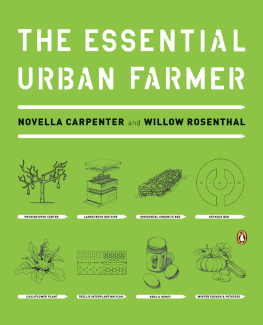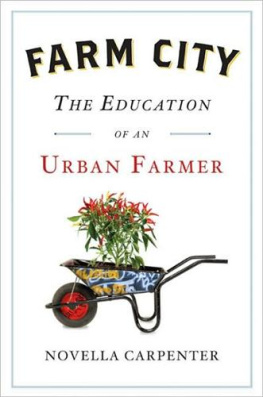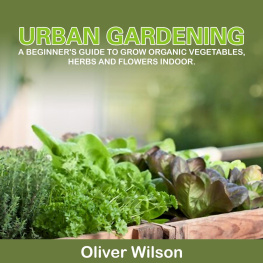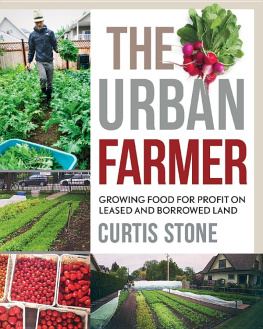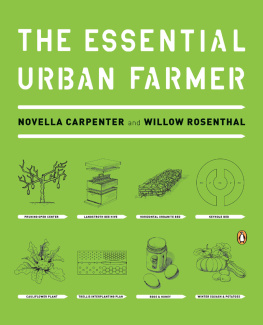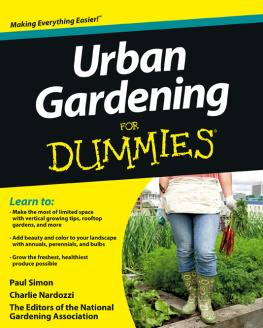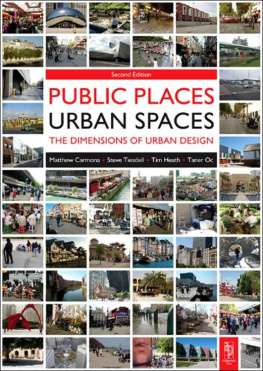Novella Carpenter - The Essential Urban Farmer
Here you can read online Novella Carpenter - The Essential Urban Farmer full text of the book (entire story) in english for free. Download pdf and epub, get meaning, cover and reviews about this ebook. year: 2011, publisher: Penguin Books, genre: Children. Description of the work, (preface) as well as reviews are available. Best literature library LitArk.com created for fans of good reading and offers a wide selection of genres:
Romance novel
Science fiction
Adventure
Detective
Science
History
Home and family
Prose
Art
Politics
Computer
Non-fiction
Religion
Business
Children
Humor
Choose a favorite category and find really read worthwhile books. Enjoy immersion in the world of imagination, feel the emotions of the characters or learn something new for yourself, make an fascinating discovery.
- Book:The Essential Urban Farmer
- Author:
- Publisher:Penguin Books
- Genre:
- Year:2011
- Rating:5 / 5
- Favourites:Add to favourites
- Your mark:
- 100
- 1
- 2
- 3
- 4
- 5
The Essential Urban Farmer: summary, description and annotation
We offer to read an annotation, description, summary or preface (depends on what the author of the book "The Essential Urban Farmer" wrote himself). If you haven't found the necessary information about the book — write in the comments, we will try to find it.
The Essential Urban Farmer — read online for free the complete book (whole text) full work
Below is the text of the book, divided by pages. System saving the place of the last page read, allows you to conveniently read the book "The Essential Urban Farmer" online for free, without having to search again every time where you left off. Put a bookmark, and you can go to the page where you finished reading at any time.
Font size:
Interval:
Bookmark:

PENGUIN BOOKS
THE ESSENTIAL URBAN FARMER
NOVELLA CARPENTER is the author of the bestselling Farm City: The Education of an Urban Farmer. She lives and farms in Oakland with her partner Billy, one cat, three ducks, five rabbits, two goats, and fifty thousand honeybees.
WILLOW ROSENTHAL is the founder of City Slicker Farms in Oakland, California, and teaches adults and children about urban gardening and consults with various groups to implement urban farming strategies. She lives in North Berkeley with her husband where they tend a very small veggie garden of their own.
ALSO BY NOVELLA CARPENTER
Farm City: The Education of an Urban Farmer

PENGUIN BOOKS
Published by the Penguin Group
Penguin Group (USA) Inc., 375 Hudson Street, New York, New York 10014, U.S.A.
Penguin Group (Canada), 90 Eglinton Avenue East, Suite 700,
Toronto, Ontario, Canada M4P 2Y3 (a division of Pearson Penguin Canada Inc.)
Penguin Books Ltd, 80 Strand, London WC2R 0RL, England
Penguin Ireland, 25 St Stephens Green, Dublin 2, Ireland
(a division of Penguin Books Ltd)
Penguin Group (Australia), 250 Camberwell Road, Camberwell, Victoria 3124, Australia
(a division of Pearson Australia Group Pty Ltd)
Penguin Books India Pvt Ltd, 11 Community Centre,
Panchsheel Park, New Delhi - 110 017, India
Penguin Group (NZ), 67 Apollo Drive, Rosedale, Auckland 0632, New Zealand
(a division of Pearson New Zealand Ltd)
Penguin Books (South Africa) (Pty) Ltd, 24 Sturdee Avenue,
Rosebank, Johannesburg 2196, South Africa
Penguin Books Ltd, Registered Offices:
80 Strand, London WC2R 0RL, England
First published in Penguin Books 2011
Copyright Novella Carpenter and Willow Rosenthal, 2011
All rights reserved
Photographs: Sophia Wang
Hand drawn illustrations: Bronwyn Barry
Computer generated illustrations: Arianna Rosenthal
LIBRARY OF CONGRESS CATALOGING IN PUBLICATION DATA
Carpenter, Novella, 1972
The essential urban farmer / Novella Carpenter and Willow Rosenthal.
p. cm.
Includes index.
ISBN: 978-1-101-55932-1
1. Urban agriculture. I. Rosenthal, Willow. II. Title.
S494.5.U72C36 2012
635.977dc23
2011039313
Designed by Sabrina Bowers
Except in the United States of America, this book is sold subject to the condition that it shall not, by way of trade or otherwise, be lent, resold, hired out, or otherwise circulated without the publishers prior consent in any form of binding or cover other than that in which it is published and without a similar condition including this condition being imposed on the subsequent purchaser.
All rights reserved. No part of this book may be reproduced, scanned, or distributed in any printed or electronic form without permission. Please do not participate in or encourage piracy of copyrighted materials in violation of the authors rights. Purchase only authorized editions.

Version_3
Dedicated to fellow urban farmers, past, present, and future.
Please note that illustrations throughout are not necessarily to scale.
W illow and I first bonded over urban farming. We were both growing vegetables, beekeeping, and raising chickens and ducks in the middle of the city of Oakland, California. When we met, at the turn of the century, I had recently started GhostTown Farm, one-tenth of an acre farm on squatted land near downtown. Willow had founded City Slicker Farms a few years before, as a nonprofit urban farming organization devoted to making affordable, urban-grown organic produce available to low-income residents in West Oakland. This is the book that we wished we had when we first started out, a how-to manual that speaks directly to farmers trying to grow food and raise animals in the city.
We became passionate about urban farming for a variety of reasons. One is the way urban agriculture connects urban people to the food they are eating. The lettuce someone seeds, waters, and then harvests for dinner makes the freshest, most delicious salad they have ever had. Backyard chicken eggs are a revelation, partially because they are so fresh and partially because you raised the hen who laid this special gift. We realized that many city folks dont think they can produce their own food, and so they miss out on these connections. By growing even a little food in the city, these experiences become accessible.
Speaking of accessibility, urban farming is a way for people of all income levels to eat fresh, local, organic food. I knew that I didnt have enough money to buy organic produce or meat, and so I decided to raise it myself. An average urban backyard (25 feet by 40 feet), if cultivated intensively, has the potential to grow all of the fruits and vegetables for one person. Growing edibles in the cityeven on a deck or small backyardmakes economic sense for people who have more time than money. Due to low incomes and lack of access to grocery stores, urban people fail to get the healthy nutrition they need. A few packets of seeds costing less than twenty dollars can produce enough vegetables for a years worth of eating. If government regulations were changed and financial support given, many of the fruits and vegetables consumed in a city could be grown within the city itself, through a combination of backyard gardening, community gardening, school gardens, commercial gardens, and increasing urban agriculture on currently unused municipal land. This would mean everyone would have access to healthy organic food!
I say organic because this is the farming method that we encourage everyone to use. Organic means that you dont use chemically synthesized fertilizers or pesticidestwo things that your neighbors in the city do not need to be exposed to. Other aspects of organic farming that we encourage, and explain in this book, are: building soil fertility through crop rotation; proper application of compost and green manures; and controlling weeds and pests by mulching, picking by hand, or using natural sprays or mixtures.
Rural organic farms do not necessarily follow practices that are sustainable for the earth, animals, or human beings. Growing in the city also means that you can go a bit beyond organic by growing a variety of crops on one site (instead of growing a single crop [monoculture]), using water efficiently, integrating livestock, and using city wastes to create a more closed-loop nutrient system. This avoids the use of factory-made fertilizers, using fossil fuels for operating farm machinery, or shipping produce and inputsand, unlike commercial farms, ensures fair and safe labor practices.
Another method of urban farming is intensive farming, which enables growers to achieve high food yields in small spaces. Crops are spaced as tightly as possible and soil fertility is continuously built to support their growth. To achieve the highest yields possible while also maintaining the overall health of the plants and animals, we focus on the soil; because of this, the crops will thrive.
We have taken principles from intensive farming (sometimes called French intensive), biodynamic farming, permaculture, and edible landscaping, rolled them up in a ball and called it urban farming. As you begin to build your urban farm, youll no doubt encounter other useful methods and ideas. There is no perfect way: raising food is a constantly changing dialogue between you the farmer and the landscape, animals, community members, and political and social circumstances.
Font size:
Interval:
Bookmark:
Similar books «The Essential Urban Farmer»
Look at similar books to The Essential Urban Farmer. We have selected literature similar in name and meaning in the hope of providing readers with more options to find new, interesting, not yet read works.
Discussion, reviews of the book The Essential Urban Farmer and just readers' own opinions. Leave your comments, write what you think about the work, its meaning or the main characters. Specify what exactly you liked and what you didn't like, and why you think so.

